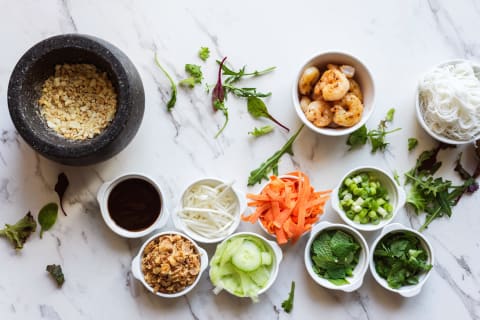Advertisement
10 Simple Ways To Stop Craving Carbs All The Time

If there is one thing everyone can agree on to maintain a healthy weight, it's cutting down significantly on their intake of sugar and refined carbohydrates.
I say "refined carbs" because unrefined carbs like beans, fruits, and whole grains are carbs, per se, but unlike bread that is bleached and heavily processed into flour, natural carbohydrates are metabolized slowly and won't send your blood sugar on a high-speed train ride up. Spikes in blood sugar are a ticket to cravings, hunger, and lethargy.
That being said, cutting out carbs and sugar is way easier said than done. The blood sugar roller coaster is no joke, and the changes in our gut bacteria that come with perpetual sugar and carb consumption make us crave those very foods like nobody's business. Luckily, you can use these 10 great tips to help get yourself off the carb-sugar train:
1. Drink more water (or low-calorie drinks!).
Probably more times than you realize, you are confusing hunger with thirst. So sipping on water, sparkling water, low-sugar kombucha, or iced herbal tea throughout the day is a great way to make sure you're not dehydrated. It's also a great way to keep yourself busy, so you don't turn to mindless snacking.
2. Let vegetables multitask for you.
Eating veggies—especially those high in cellulose like dark leafy greens (especially the stems) and cruciferous vegetables—results in increased intestinal bulk. Their high water content also increases satiety. They also promote hormonal balance, help repopulate the gut, and give you phytonutrients not available elsewhere. On top of all that, they are also the most nutrient-dense foods out there. Need I say more?
3. Fill up on high-fiber foods.

High soluble-fiber foods—like properly soaked beans, legumes, vegetables, and fruit—will stretch your stomach and empty it slowly, which means you'll feel fuller and more satisfied for longer. Fiber also slows the release of sugar into the blood, stabilizing blood sugar, curbing hunger, and cutting down on cravings. Lastly, fiber is the mainstay for gut and hormone health. Good gut bacteria need prebiotic fiber to function well. Consuming more fiber can transform your health, especially your cravings for sugar and carbs.
4. Sit down and eat without distraction.
I know it is tempting to eat in front of a screen or newspaper, but taking time to eat sitting down, relaxed, and focused on each bite aids digestion. Not only will you chew more, but when your brain can register each bite, you feel fuller faster. We also know that harried emotions (anxiety and depression) can bring on disordered eating. All in all, it's best to eat when you are away from stress.
5. Chew your calories (slowly), and don't drink them.
A study published in the Journal of the Academy of Nutrition and Dietetics1 in 2014 concluded that those who chewed the most ate the least. That's because, like sitting down without distraction, chewing alerts the hunger hormone, ghrelin, that food is coming in. If you eat too fast or down a smoothie in 90 seconds, it doesn't register as completely and your brain will prompt hunger. Rushing also creates an insulin spike, which will cause you to become hungry again as soon as it goes away.
6. Prioritize eight to nine hours of sleep.
Sleep is a big factor in how much ghrelin you produce, and to put it simply: The less sleep you get, the more ghrelin is produced and the hungrier you are.
Not to mention, sleep aids stress relief, and stress is a fast train to emotional eating. Getting eight to nine hours of dark, uninterrupted sleep is one of the best things you can do for your waistline and overall health. If you need a little help winding down or suffer from insomnia, try using 1 milligram of melatonin every evening.
7. Use your caffeine wisely.

Caffeine can be an appetite suppressant, but it also dehydrates you and can lead to a crash. So drink your coffee in the a.m. and then don't overdo it in the afternoon. Some slow caffeine metabolizers (like me) need to limit their intake to one cup a day. For others, one cup of coffee and one to two cups of green tea works well.
8. Fully immerse yourself in your work and activities.
Boredom is one of the largest contributors to mindless snacking, and lack of purpose and isolation can lead to emotional eating. What's the solution? Move! Do things you love with people you love, preferably outdoors. You'll feel great, and when you feel great, you don't crave comfort food.
9. Consider natural carb craving aids like L-glutamine, cinnamon, and chromium.
I don't recommend these as everyday things (except cinnamon; I definitely have cinnamon every day!). But if and when those insatiable hunger and carb cravings strike, the amino acid L-glutamine and the mineral chromium can be terrific tools, decreasing carb cravings in as quickly as 20 minutes.
10. Make room for the occasional treat.
Feeling deprived is no good for long-term health. If you say, "I'll never eat ice cream or crusty bread again!" you will likely obsess or eventually overindulge. Find healthful alternatives daily (like two squares dark chocolate), or have the real stuff on birthdays and special nights. If you're straying from your healthy diet one meal a week, you're doing just fine!
These 10 tips will help free you from carb cravings so that you can go back to your life and worry about more important things, like your work, your hobbies, cooking, and time spent with friends.

Dr. Amy Shah is a double board certified MD with training from Cornell, Columbia and Harvard Universities. She was named one of mindbodygreen's Top 100 Women In Wellness to Watch in 2015 and has been a guest on many national and local media shows. She helps busy people transform their health by reducing inflammation and eating more plants, utalizing the power of the microbiome to help digestion, natural hormone balance and food sensitivities. She is an expert on intermittent fasting for women and has a 2 week guided group program.
More from the author:
Functional Nutrition Training
Check out Functional Nutrition Coaching
A cutting-edge nutrition deep dive taught by 20+ top health & wellness experts
Learn moreMore from the author:
Functional Nutrition Training
Check out Functional Nutrition Coaching
A cutting-edge nutrition deep dive taught by 20+ top health & wellness experts
Learn more
Dr. Amy Shah is a double board certified MD with training from Cornell, Columbia and Harvard Universities. She was named one of mindbodygreen's Top 100 Women In Wellness to Watch in 2015 and has been a guest on many national and local media shows. She helps busy people transform their health by reducing inflammation and eating more plants, utalizing the power of the microbiome to help digestion, natural hormone balance and food sensitivities. She is an expert on intermittent fasting for women and has a 2 week guided group program.


















